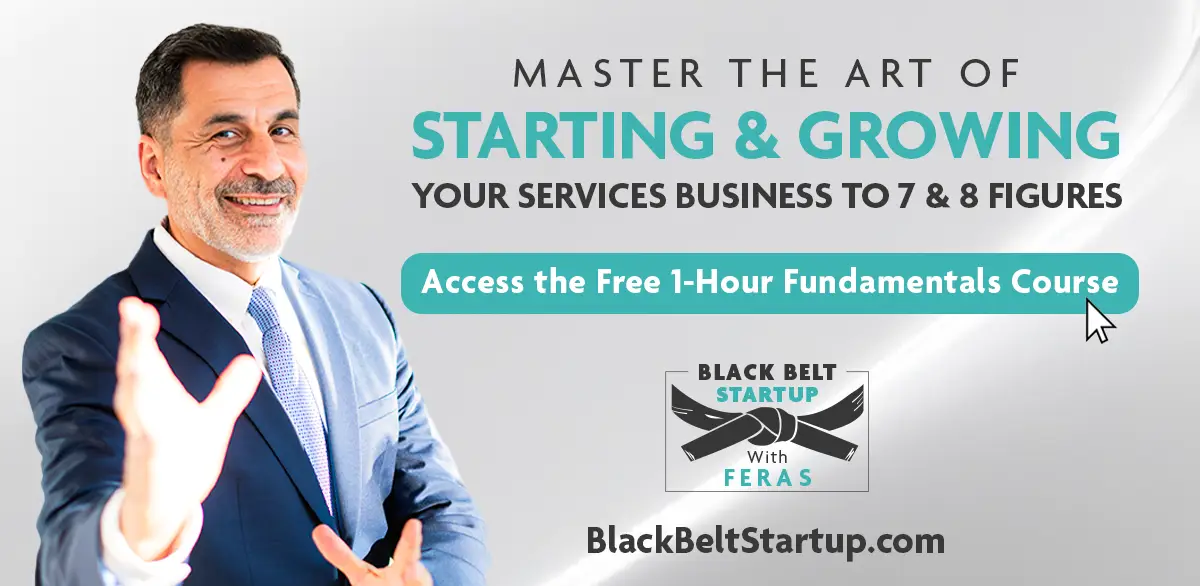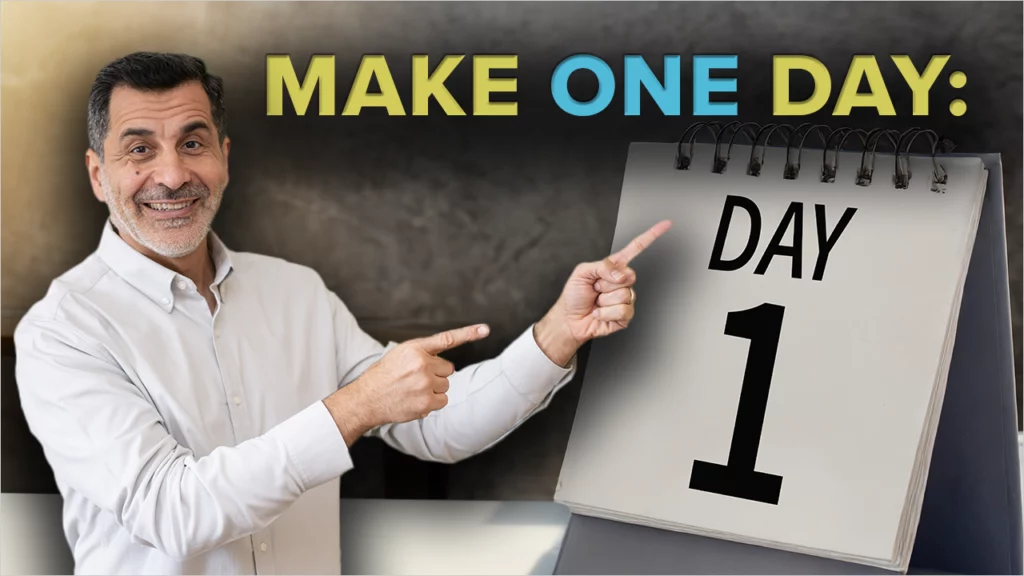How to Develop an Entrepreneurial Mindset Using Age-Old Martial Arts Principles

At fifteen, martial arts became my whole world. I trained every day to earn my black belt, guided by a strict teacher who never accepted excuses.
But just months before I reached my goal, my dad pulled the plug because my school grades were slipping, and it all ended in an instant.
I was heartbroken and felt like I had lost everything until I realized the most incredible gift martial arts had given me was discipline. That discipline helped me turn setbacks into new chances and guided me to launch seven successful service businesses.
If you’re feeling stuck, doubting whether you’re cut out for entrepreneurship, know this: You’re not alone. And you’re far from finished.
I want to train you on how to develop an entrepreneurial mindset by sharing the exact six martial arts-inspired principles that transformed my journey.
These principles will empower you, whether you’re in martial arts or not, to master the entrepreneurial mindset, overcome obstacles, and scale your consulting business beyond your dreams.
What Is an Entrepreneurial Mindset?
An entrepreneurial mindset is about spotting opportunities where others see only problems. Instead of just dreaming of building a business, you learn to recognize new ways of doing things, adapt quickly, and keep moving forward even when things get tough.
Three main characteristics define an entrepreneurial mindset clearly:
- Resilience: You keep going, even when things get tough. You see failures as lessons, not roadblocks.
- Adaptability: You quickly change your approach if things aren’t working. You don’t stubbornly stick to your original plan if evidence points in another direction.
- Continuous Learning: You’re always improving yourself and your ideas. You ask questions, try new things, and seek feedback constantly.
This mindset matters because your ability to succeed in business depends mostly on how you handle challenges, not just your skill, experience, or passion.
Why an Entrepreneurial Mindset is Essential for Success
Your mindset decides everything—how you make choices, how you handle risk, and how you solve problems. You need to realize that success in consulting isn’t always about knowing more; it’s about thinking differently.
For example, many new consultants fear rejection. They’ll spend weeks tweaking their websites or business cards instead of taking the leap and talking to potential clients.
But successful entrepreneurs like Chris Do, founder of “The Futur,” took a completely different path. Chris openly says he succeeded by failing faster and more openly than others.
Instead of avoiding rejection, he deliberately embraced failure and put himself in situations to face it. Every rejection was a step closer to figuring out exactly what clients wanted.
In my own experience, my first attempts at building a consulting business were slow and painful. I tried to perfect every tiny detail before approaching clients.
Things only changed when I realized clients don’t care if you’re perfect; they care if you understand their problems and can clearly solve them. Once I started openly sharing how I could solve client problems even before everything felt “ready”, my businesses began thriving.
One vital point: Your mindset is more important than your methods. Clients sense confidence and adaptability. They don’t buy services, they buy your certainty and clarity in solving their issues.
Entrepreneurial Mindset vs. Employee Mindset
Many people believe having an entrepreneurial mindset means simply avoiding a fixed thinking. While that’s partly true, there’s more to the story. Let’s break it down:
| Mindset | Core Focus | Typical Behaviours | Result |
| Employee | Stability inside an existing system | • Follows clear instructions
• Sticks to proven processes • Seeks approval from managers |
Work gets done, but new ideas move slowly. |
| Entrepreneurial | Opportunity outside the system | • Spots gaps and unmet needs
• Experiments quickly • Acts without waiting for permission |
Innovation happens fast, and new value is created. |
After seeing how employee and entrepreneurial mindsets show up in daily behavior, it’s important to look deeper, especially at how each one approaches learning and mistakes.
Many employees operate in environments that reward caution. So even if they’re capable of growing, they may slip into fixed thinking: avoiding risks, sticking to what’s safe, and seeing mistakes as setbacks.
On the other hand, entrepreneurs must embrace growth thinking. They know progress comes from testing, learning, and adapting fast, even when things go wrong.
What separates entrepreneurs isn’t just that they believe they can grow; it’s that they act on it. They take messy action, test ideas early, and treat every mistake as useful feedback. That mindset in motion is what keeps their businesses moving forward.
For example, think about a new consultant named Karen. At first, she waited for clients to find her on LinkedIn, hoping her polished profile would attract business.
Months passed with no leads. Frustrated, she realized waiting for permission wasn’t working.
She switched her approach, reaching out to potential clients directly and offering quick, helpful mini-sessions.
Almost immediately, people noticed the shift. Karen was no longer acting like an employee stuck in a fixed mindset, waiting for approval and playing it safe.
She had stepped into a growth mindset, taking bold action and learning as she went. Within weeks, she landed several qualified leads by simply showing up like an entrepreneur in control of her own success.
The big lesson here? An entrepreneurial mindset isn’t tied to job titles or roles. It’s about taking bold steps without waiting for someone else’s go-ahead.
That simple yet powerful shift is exactly what many service-based businesses need, especially if you’re just starting out or struggling to grow.
The 6 Principles of an Entrepreneurial Mindset, Inspired by Martial Arts
To start strong and build real momentum in your consulting business, you need more than just strategies. You need to master these 6 martial arts principles, and you will think, act, and grow like an entrepreneur ready for lasting success.
Principle 1: Beginner’s Mind (Shoshin)
The Importance of Staying Open-Minded
Most entrepreneurs agree that curiosity is important, but very few actually practice it as seriously as martial artists practice moves.
In my martial arts training, I was exposed to a Japanese concept called Shoshin, or “beginner’s mind.” It means keeping your mind open, always eager, always curious, always ready to learn something new, even when you’re already skilled.
Supporting this, a study published in ScienceDirect found that encouraging curiosity in the workplace leads to increased creativity and innovation among employees.
When individuals are prompted to rethink organizational processes and goals, they tend to produce more creative solutions compared to those who stick to established routines.
Yet many entrepreneurs think curiosity is only for learning brand-new skills like finance or marketing. The real advantage lies in staying curious about the skills you already know best.
Learning Like a Beginner, Even as an Expert
A mistake I have seen countless consultants make, and one I made myself for years, is thinking experience makes feedback unnecessary.
The more skilled you become, the easier it is to believe, “I’ve done this hundreds of times, I know what’s best,” but that’s exactly when real growth starts to stall.
One consultant I once worked with had been training executives on leadership for years. He stopped asking clients for feedback because he was sure he already knew what worked. Then, suddenly, he started losing clients.
When he finally asked for feedback again, he was shocked. They told him he wasn’t adapting to changes in leadership styles and market needs.
The big lesson is that to reach mastery, you must stay curious like a beginner, even in the skills you know best.
Principle 2: Relaxed Alertness
The Power of Presence in Business
In martial arts, relaxed alertness means staying relaxed but fully alert, always aware of everything around you. Successful entrepreneurs use this same skill.
For example, during a client meeting, being “alert” means deeply listening instead of anxiously thinking about your next sentence. It’s noticing small signs, like a client’s tone or body language, that tell you if they’re really ready to buy or holding back.
Many entrepreneurs miss a key point. Business success depends less on what you say and more on how carefully you listen.
I learned this early in my consulting career, after repeatedly losing deals because I was too busy talking about my expertise. Once I slowed down, paid attention, and truly listened, clients began saying yes far more often.
Balancing Deep Focus and Big-Picture Thinking
Let me share an insight about specialized skills: sometimes your deepest strength can trap you.
This is especially true for consultants with highly technical skills. Maybe you’re a web designer who obsesses over details, or a data analyst who loves diving deep into spreadsheets. That’s great, but you can’t stay stuck in the details forever.
As an entrepreneur, you must regularly step back and ask bigger questions, like:
- How does your specialty fit into current business trends?
- Are there new client needs you haven’t considered yet?
Centering lets you shift smoothly from details to the bigger picture and back again, making you far more valuable as a consultant.
Principle 3: Successive Approximation
Taking Action Without Perfection
Many consultants fear starting before they’re fully ready. They want everything to be perfect before talking to a single client and are adverse to taking risks. But here’s the brutal truth:
Waiting for perfection is why most businesses never start at all.
Reid Hoffman, founder of LinkedIn, famously said:
“If you’re not embarrassed by the first version of your product, you launched too late.”
When I launched my first consulting practice, my website was embarrassingly simple. But that simple step got me my first clients. Waiting until everything felt perfect would have meant never launching at all.
Avoiding Overplanning Paralysis
Every business indeed needs a basic roadmap. But there’s a hidden trap many new entrepreneurs fall into, known as overplanning paralysis.
They spend so much time perfecting their plans that they never take the first step. In reality, the most successful consultants start with a workable strategy and adjust as they go, taking calculated risks and learning from each challenge and opportunity that arises.
Remember that your plan is your guide, not your prison.
Principle 4: Stay Organized
The Role of Systems in Entrepreneurial Success
In Aikido, every movement has structure; even in flow, there is form. Techniques only work when your body is aligned, your stance is stable, and your movements follow a practiced rhythm.
Without structure, balance is lost. In business, it’s the same: structure creates flow.
James Clear, author of Atomic Habits, put it perfectly: “You don’t rise to the level of your goals. You fall to the level of your systems.”
As a consultant, your success depends on the systems you build, task management, client onboarding checklists, team workflows, and, as you grow, tools like a CRM (client relationship management).
These may not be flashy, but they keep your business balanced and ready to move with power. You also need to understand that organization isn’t just helpful, it can literally save your business.
Take Lisa, a talented consultant I worked with. She lost a $7,500 upsell simply because she forgot to follow up with a client during their year-end budget window.
That painful moment pushed her to build a basic CRM and tighten her process. Once her structure was in place, her business picked up again almost immediately.
Just like in Aikido, if your foundation is shaky, your moves fall apart. But with structure, everything flows.
Tools and Strategies for Staying on Track
Don’t worry about complicated software. Start with simple solutions:
- Use a basic spreadsheet (like Google Sheets) to track leads and conversations.
- Keep your workspace tidy—physical clutter leads to mental clutter.
- Set clear daily priorities so you always know what to tackle first.
These small but powerful habits let you focus on serving your clients instead of trying to manage chaos.
Principle 5: Staying Empathetic
Understanding Clients Beyond the Transaction
In the martial art of Aikido, the goal isn’t to defeat your opponent; it’s to harmonize with their energy. In consulting, you must adopt the same mindset.
You need to stop seeing clients as transactions and start seeing them as partners with emotional goals.
Imagine yourself changing your entire consulting approach. Instead of immediately pitching your services, you begin conversations by simply asking, “What’s your biggest worry right now?” Clients instantly feel seen and heard. Your business accelerates in just a few months because clients trust you deeply.
Applying Emotional Intelligence to Business
Empathy isn’t just about being nice; it’s a valuable business skill. When clients feel understood, they’re loyal, and when they’re loyal, your business thrives.
Remember, empathy isn’t a soft skill; it’s your strongest competitive advantage.
Principle 6: Empowerment
The Entrepreneur’s Role in Empowering Others
In Aikido, the goal isn’t to overpower your opponent—it’s to redirect their energy in a way that restores balance. True power isn’t about control. It’s about creating space for strength to emerge in others.
The same holds true in consulting, clients don’t just want services. They want results, and they want to feel empowered by those results.
Your real job isn’t just to deliver solutions. It’s to help clients walk away stronger, smarter, and more confident than when they came to you.
For example, when I first started training entrepreneurs, I worried that if I empowered them too much, they’d no longer need me. The exact opposite happened. Empowered clients referred others because they trusted me deeply.
Building a Business That Fosters Growth
Creating a culture of empowerment isn’t complicated:
- Give clients tools or frameworks they can use independently.
- Encourage open communication so they feel confident and capable.
- Celebrate their progress publicly, making them feel valued.
Empowering clients creates loyalty, referrals, and long-term business stability.
Key Takeaways and Actions
Growing a successful consulting or service business takes more than skill and effort. It demands the right entrepreneurial mindset, one built on discipline, clarity, and continuous learning. To put the six martial arts-inspired principles into action, consider these powerful steps:
- Embrace the beginner’s mind: Never assume you’ve learned enough. Regularly seek feedback from your clients, team, and even competitors. Stay curious, ask questions, and actively practice humility. A beginner’s mindset isn’t a weakness, it’s your most powerful tool for continuous growth.
- Stay centered and present: Practice mindfulness in every client interaction. Listen actively, pay attention to small signals, and focus fully on each conversation. Your clients will feel heard and understood, building trust that translates directly into loyalty and increased sales.
- Take imperfect action: Don’t let fear of mistakes or judgment stop you from launching. Start with an idea, take small steps, learn from feedback, and improve continuously. Action beats perfection every time especially when building your business.
- Build powerful organizational systems: Set up simple but effective systems, like CRMs, organized schedules, and clear checklists. Remember, your success depends less on goals and more on the quality of your systems. When you’re organized, you can spend more time serving clients and less time chasing loose ends.
- Lead with genuine empathy: Move beyond transactional thinking and learn to truly understand your client’s worries, motivations, and emotional stakes. Start every engagement by asking, “What’s your biggest worry right now?” Empathy isn’t just kindness, it’s your competitive advantage.
- Empower your clients (and yourself): Build services that leave your clients feeling stronger, smarter, and more capable. Teach skills, provide tools, and help your clients become self-sufficient. Empowered clients become loyal clients who eagerly refer others.
By putting these ideas into action, you’ll move beyond day-to-day struggles and begin to build a lasting, thriving consulting business. Commit to growth, remain adaptable, and use these six martial arts principles as your roadmap to developing an entrepreneurial mindset and a successful business.




